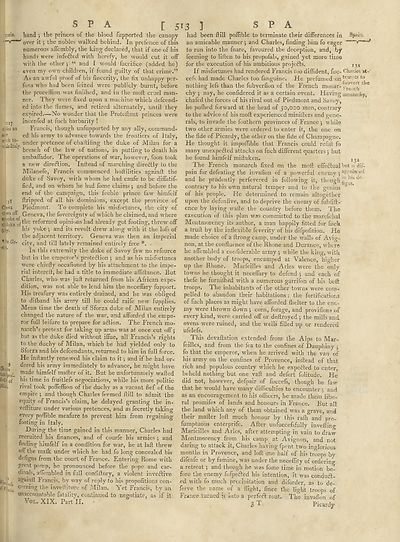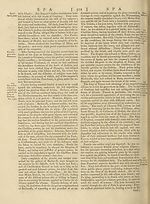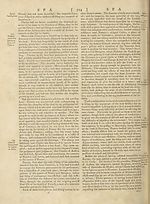Encyclopaedia Britannica, or, a Dictionary of arts, sciences, and miscellaneous literature : enlarged and improved. Illustrated with nearly six hundred engravings > Volume 19, Scripture-SUG
(561) Page 513
Download files
Complete book:
Individual page:
Thumbnail gallery: Grid view | List view

Ti?
< les an
I "
irch to-
:2S
ClBva
SPA [s
liand j tlie princes of the blood fupported the canopy-
over it *, the nobles walked behind. In prefence of this
numerous aflembly, the king declared, that if one of his
hands were infedted with hcrefy, he would cut it off
with the other ; “ and I would facrifice (added he)
«ven my own children, if found guilty of that crime.”
As an awful proof of his fincerity, the fix unhappy per¬
forms who had been feized were publicly burnt, before
the proceffion was finiihed, and in the molt cruel man¬
ner. They were fixed upon a machine which defcend-
ed into the flames, and retired alternately, until they
expired.—No wonder that the Proteftant princes were
incenfed at inch barbarity !
Francis, though unfupported by any ally, command¬
ed his army to advance towards the frontiers of Italy,
* Mtal un^er Pretence chaltiiing the duke of Milan for a
' breach of the law of nations, in putting to death his
ambaflador. The operations of war, however, foon took
a new direction. Inllead of marching diredtly to the
Milanefe, Francis commenced hoftilities againft the
duke of Savoy, with whom he had caufe to be diffatif-
fied, and on whom he had fome claims; and before the
end of the campaign, this feeble prince faw himfelf
dripped of all his dominions, except the province of
Piedmont. To complete his misfortunes, the city of
tlfws °fF^ Geneva, the fovereignty of which he claimed, and where
Mkkeof the reformed opinions had already got footing, threw off
gily, his yoke; and its revolt drew along with it the lofs of
the adjacent territory. Geneva was then an imperial
city, and till lately remained entirely free *. -
In this extremity the duke of Savoy faw no refource
but in the emperor’s proteflion ; and as his misfortunes
were chiefly occafioned by his attachment to the impe¬
rial interelt, he had a title to immediate afliitance. But
Charles, who was juft returned from his African expe¬
dition, was not able to lend him the necelfary fupport.
His treafury was entirely drained, and he was obliged
to dithand his army till he could raife new fupplies.
Mean time the death of Sforza duke of Milan entirely
changed the nature of the war, and afforded the empe¬
ror full leifure to prepare for action. The French mo-
. narch’s pretext for taking up arms was at once cut off;
but as the duke died without iffue, all Francis’s rights
to the duchy of Milan, which he had yielded only to
Sforza and his dcfcendants, returned to him in full force.
He inftantly renewed his claim to it; and if he had or¬
dered his army immediately to advance, he might have
made himfelf mafter of it. But he unfortunately wafted
his time in fruitlefs negociations, while his more politic
rival took poffeflion of the duchy as a vacant fief of the
empire ; and though Charles feemed ftill to admit the
equity of Francis’s claim, he delayed granting the in-
veftiture under various pretences, and as fecretly taking
every poftible meafure to prevent him from regaining
footing in Italy.
During the time gained in this manner, Charles had
recruited his finances, and of courfe his armies ; and
finding himfelf in a condition for war, he at laft threw
oft the mafk under which he had fo long concealed his
defigns from the court of France. Entering Rome with
great pomp, he pronounced before the pope and car¬
dinals, affembled in full confiftory, a violent inveflive
againft Francis, by way of reply to his propofitions con¬
cerning the inveftiture of Milan. Yet Francis, by an
unaccountable fatality, continued to negotiate, as if it
Vgl. XIX. Part II. ■
tak |)oi’-
fcfl of?
Mi.
13 ] SPA
had been ftill poflible to terminate their differences in Spain,
an amicable manner ; and Charles, finding him fo eager ^ " J
to run into the fnare, favoured the deception, and, by
feeming to liften to his propofals, gained yet more time
for the execution of his ambitious projects. T vr
If misfortunes had rendered Francis too diffident, fuc- Charles at-'
cefs had made Charles too fanguine. He prefumed on tciri:)ts to
nothing lefs than the fubverfion of the French monar-118
chy ; nay, he confidered it as a certain event. Having monarchy,
chafed the forces of his rival out of Piedmont and Savoy,
he pufhed forward at the head of 50,000 men, contrary
to the advice of his moft experienced minifters and gene¬
rals, to invade the fouthern provinces of France ; while
two other armies were ordered to enter it, the one on
the fide of Picardy, the other on the fide of Champagne.
He thought it impoftible that Francis could refill fo
many unexpefted attacks on fuch different quarters; but
he found himfelf miftaken.
The French monarch fixed on the moft effectual but is dif-
pain for defeating the invafion of a powerful enemy ; aProin:et
and he prudently perfevered in following it, though j-j'J1*4 ^
contrary to his own natural temper and to the genius 0 ’
of his people. He determined to remain altogether
upon the defenfive, and to deprive the enemy of fubfift-'
ence by laying wafte the country before them. The
execution of this plan was committed to the marefcbal
Montmorency its author, a man happily fitted for fuck
a truft by the inflexible feverity of his difpofition. He
made choice of a ftrong camp, under the walls of Avig¬
non, at the confluence of the Rhone and Durance, where
he aflcmbled a confiderable army ; while the king, with
another body of troops, encamped at Valence, higher
up the Rhone. Marfeilles and Arles wmre the only
towns he thought it neceflary to defend ; and each of
thefe he furnifhed with a numerous garrifon of his belt
troops. The inhabitants of ihe other towns were com¬
pelled to abandon their habitations : the fortifications
of fuch places as might have afforded fhelter to the ene¬
my were thrown down ; corn, forage, and provifions of
every kind, were carried off or deftroyed ; the mills and
ovens svere ruined, and the wells' filled up or rendered
ufelefs.
This devaftation extended from the Alps to Mar¬
feilles, and from the lea to the confines of Dauphiny ;
fo that the emperor, when he arrived with the van of
his army on the confines of Provence, inftead of that
rich and populous country which he expelled to enter,
beheld nothing but one vaft and defert folitude. He
did not, however, defpair of fuccefs, though he faw
that he would have many difficulties to encounter and
as an encouragement to his officers, he made them libe¬
ral promifes of lands and honours in France. But all
the land which any of them obtained was a grave, and
their mafter loft much honour by this rafh and pre-
fumptuous enterprife. After unfuccefsfully invefting
Marfeilles and Arles, after attempting in vain to draw
Montmorency from his camp at Avignon, and not
daring to attack it, Gharles having fpent two inglorious
months in Provence, and loft one half of his troops by
difeafe or by famine, was under the neceffity of ordering
a retreat; and though he was fome time in motion be¬
fore the enemy fufpefled his intention, it was conduc¬
ed with fo much precipitation and diforder, as to de-
ferve the name of a flight, fince the light troops of
France turned it into a perfeft rout. The invafion of
3 ^ Picardy
< les an
I "
irch to-
:2S
ClBva
SPA [s
liand j tlie princes of the blood fupported the canopy-
over it *, the nobles walked behind. In prefence of this
numerous aflembly, the king declared, that if one of his
hands were infedted with hcrefy, he would cut it off
with the other ; “ and I would facrifice (added he)
«ven my own children, if found guilty of that crime.”
As an awful proof of his fincerity, the fix unhappy per¬
forms who had been feized were publicly burnt, before
the proceffion was finiihed, and in the molt cruel man¬
ner. They were fixed upon a machine which defcend-
ed into the flames, and retired alternately, until they
expired.—No wonder that the Proteftant princes were
incenfed at inch barbarity !
Francis, though unfupported by any ally, command¬
ed his army to advance towards the frontiers of Italy,
* Mtal un^er Pretence chaltiiing the duke of Milan for a
' breach of the law of nations, in putting to death his
ambaflador. The operations of war, however, foon took
a new direction. Inllead of marching diredtly to the
Milanefe, Francis commenced hoftilities againft the
duke of Savoy, with whom he had caufe to be diffatif-
fied, and on whom he had fome claims; and before the
end of the campaign, this feeble prince faw himfelf
dripped of all his dominions, except the province of
Piedmont. To complete his misfortunes, the city of
tlfws °fF^ Geneva, the fovereignty of which he claimed, and where
Mkkeof the reformed opinions had already got footing, threw off
gily, his yoke; and its revolt drew along with it the lofs of
the adjacent territory. Geneva was then an imperial
city, and till lately remained entirely free *. -
In this extremity the duke of Savoy faw no refource
but in the emperor’s proteflion ; and as his misfortunes
were chiefly occafioned by his attachment to the impe¬
rial interelt, he had a title to immediate afliitance. But
Charles, who was juft returned from his African expe¬
dition, was not able to lend him the necelfary fupport.
His treafury was entirely drained, and he was obliged
to dithand his army till he could raife new fupplies.
Mean time the death of Sforza duke of Milan entirely
changed the nature of the war, and afforded the empe¬
ror full leifure to prepare for action. The French mo-
. narch’s pretext for taking up arms was at once cut off;
but as the duke died without iffue, all Francis’s rights
to the duchy of Milan, which he had yielded only to
Sforza and his dcfcendants, returned to him in full force.
He inftantly renewed his claim to it; and if he had or¬
dered his army immediately to advance, he might have
made himfelf mafter of it. But he unfortunately wafted
his time in fruitlefs negociations, while his more politic
rival took poffeflion of the duchy as a vacant fief of the
empire ; and though Charles feemed ftill to admit the
equity of Francis’s claim, he delayed granting the in-
veftiture under various pretences, and as fecretly taking
every poftible meafure to prevent him from regaining
footing in Italy.
During the time gained in this manner, Charles had
recruited his finances, and of courfe his armies ; and
finding himfelf in a condition for war, he at laft threw
oft the mafk under which he had fo long concealed his
defigns from the court of France. Entering Rome with
great pomp, he pronounced before the pope and car¬
dinals, affembled in full confiftory, a violent inveflive
againft Francis, by way of reply to his propofitions con¬
cerning the inveftiture of Milan. Yet Francis, by an
unaccountable fatality, continued to negotiate, as if it
Vgl. XIX. Part II. ■
tak |)oi’-
fcfl of?
Mi.
13 ] SPA
had been ftill poflible to terminate their differences in Spain,
an amicable manner ; and Charles, finding him fo eager ^ " J
to run into the fnare, favoured the deception, and, by
feeming to liften to his propofals, gained yet more time
for the execution of his ambitious projects. T vr
If misfortunes had rendered Francis too diffident, fuc- Charles at-'
cefs had made Charles too fanguine. He prefumed on tciri:)ts to
nothing lefs than the fubverfion of the French monar-118
chy ; nay, he confidered it as a certain event. Having monarchy,
chafed the forces of his rival out of Piedmont and Savoy,
he pufhed forward at the head of 50,000 men, contrary
to the advice of his moft experienced minifters and gene¬
rals, to invade the fouthern provinces of France ; while
two other armies were ordered to enter it, the one on
the fide of Picardy, the other on the fide of Champagne.
He thought it impoftible that Francis could refill fo
many unexpefted attacks on fuch different quarters; but
he found himfelf miftaken.
The French monarch fixed on the moft effectual but is dif-
pain for defeating the invafion of a powerful enemy ; aProin:et
and he prudently perfevered in following it, though j-j'J1*4 ^
contrary to his own natural temper and to the genius 0 ’
of his people. He determined to remain altogether
upon the defenfive, and to deprive the enemy of fubfift-'
ence by laying wafte the country before them. The
execution of this plan was committed to the marefcbal
Montmorency its author, a man happily fitted for fuck
a truft by the inflexible feverity of his difpofition. He
made choice of a ftrong camp, under the walls of Avig¬
non, at the confluence of the Rhone and Durance, where
he aflcmbled a confiderable army ; while the king, with
another body of troops, encamped at Valence, higher
up the Rhone. Marfeilles and Arles wmre the only
towns he thought it neceflary to defend ; and each of
thefe he furnifhed with a numerous garrifon of his belt
troops. The inhabitants of ihe other towns were com¬
pelled to abandon their habitations : the fortifications
of fuch places as might have afforded fhelter to the ene¬
my were thrown down ; corn, forage, and provifions of
every kind, were carried off or deftroyed ; the mills and
ovens svere ruined, and the wells' filled up or rendered
ufelefs.
This devaftation extended from the Alps to Mar¬
feilles, and from the lea to the confines of Dauphiny ;
fo that the emperor, when he arrived with the van of
his army on the confines of Provence, inftead of that
rich and populous country which he expelled to enter,
beheld nothing but one vaft and defert folitude. He
did not, however, defpair of fuccefs, though he faw
that he would have many difficulties to encounter and
as an encouragement to his officers, he made them libe¬
ral promifes of lands and honours in France. But all
the land which any of them obtained was a grave, and
their mafter loft much honour by this rafh and pre-
fumptuous enterprife. After unfuccefsfully invefting
Marfeilles and Arles, after attempting in vain to draw
Montmorency from his camp at Avignon, and not
daring to attack it, Gharles having fpent two inglorious
months in Provence, and loft one half of his troops by
difeafe or by famine, was under the neceffity of ordering
a retreat; and though he was fome time in motion be¬
fore the enemy fufpefled his intention, it was conduc¬
ed with fo much precipitation and diforder, as to de-
ferve the name of a flight, fince the light troops of
France turned it into a perfeft rout. The invafion of
3 ^ Picardy
Set display mode to:
![]() Universal Viewer |
Universal Viewer | ![]() Mirador |
Large image | Transcription
Mirador |
Large image | Transcription
Images and transcriptions on this page, including medium image downloads, may be used under the Creative Commons Attribution 4.0 International Licence unless otherwise stated. ![]()
| Permanent URL | https://digital.nls.uk/192702575 |
|---|
| Attribution and copyright: |
|
|---|
| Description | Ten editions of 'Encyclopaedia Britannica', issued from 1768-1903, in 231 volumes. Originally issued in 100 weekly parts (3 volumes) between 1768 and 1771 by publishers: Colin Macfarquhar and Andrew Bell (Edinburgh); editor: William Smellie: engraver: Andrew Bell. Expanded editions in the 19th century featured more volumes and contributions from leading experts in their fields. Managed and published in Edinburgh up to the 9th edition (25 volumes, from 1875-1889); the 10th edition (1902-1903) re-issued the 9th edition, with 11 supplementary volumes. |
|---|---|
| Additional NLS resources: |
|

